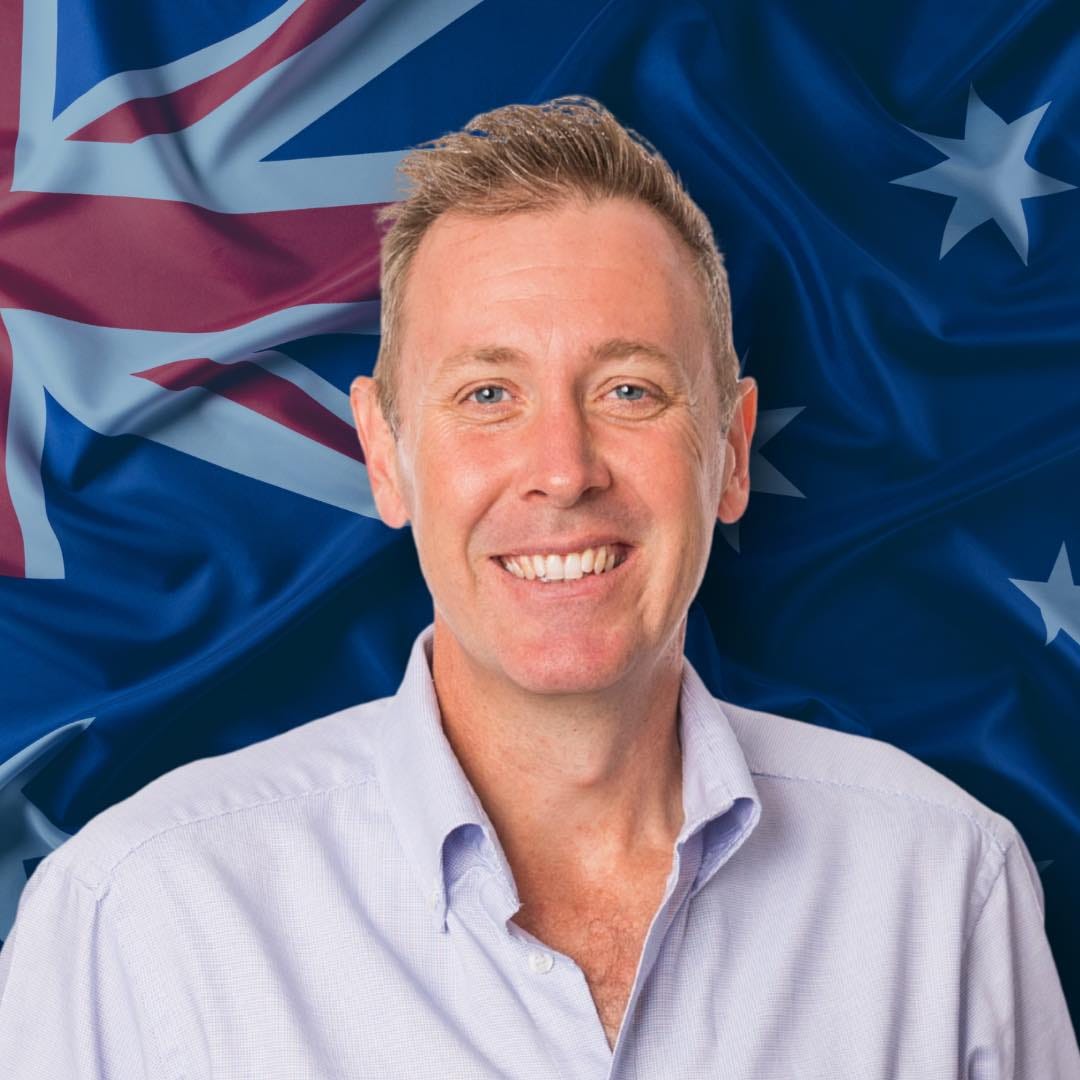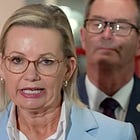Liberal Party MP Admits Coalition “Going Through Very Difficult Process,” Cannot Define Core Message to Voters
This piece is freely available to read. Become a paid subscriber today and help keep Mencari News financially afloat so that we can continue to pay our writers for their insight and expertise.
Today’s Article is brought to you by Empower your podcasting vision with a suite of creative solutions at your fingertips.
Liberal MP Garth Hamilton publicly acknowledged Thursday that Australia’s main opposition party is struggling through an internal crisis and cannot articulate what it stands for or why voters should support it, as speculation about potential defections circulated in national media and senior figures warned against populist influences within the coalition.
Speaking on Sky News AM Agenda Thursday morning, Hamilton, who represents the Queensland seat of Groom, offered a remarkably candid assessment of his party’s current predicament following its 2025 federal election defeat.
“We are going through a very difficult process, not going to lie about that, and we’re not going to get rewarded for it,” Hamilton told host Laura Jayes. “There’s some conversations we need to have. We need to resolve some pretty important policy issues. And until we do that, we’re going to be stuck in this exact same position.”
The admission came as The Australian newspaper reported Thursday that disaffected Liberals were privately discussing possible defections, though Hamilton’s interview focused primarily on policy paralysis rather than personnel movements.
Truth matters. Quality journalism costs.
Your subscription to Mencari directly funds the investigative reporting our democracy needs. For less than a coffee per week, you enable our journalists to uncover stories that powerful interests would rather keep hidden. There is no corporate influence involved. No compromises. Just honest journalism when we need it most.
Not ready to be paid subscribe, but appreciate the newsletter ? Grab us a beer or snag the exclusive ad spot at the top of next week's newsletter.
Political strategist Yaron Finkelstein, who served as an advisor to former Prime Minister Scott Morrison, provided an even blunter analysis during the same program, comparing the party to a business that cannot explain its product.
“If you were the Liberal Party, let’s say you were a business, what are you trying to sell and why should someone buy what you’re trying to sell?” Finkelstein said. “The party is going through a difficult period and it can’t answer those two questions at the moment. So it doesn’t really matter who’s trying to sell it.”
Finkelstein added: “In the absence of that clarity, you’re getting these type of games that we’re seeing about people talking about all sorts of strange hybrid models of political parties. There’s no way that we are seeing a realistic sense of purpose for the party. It doesn’t, at the moment, have something to sell.”
The internal crisis follows warnings from Senator James Paterson, the Shadow Minister for Finance and Government Services, who reportedly cautioned the party this week against following what he termed the “false prophets” of populism exemplified by Nigel Farage in the United Kingdom and Donald Trump in the United States.
Hamilton disputed characterizing concerns about net zero climate targets and immigration levels as populist positions. “I think the idea that there’s a populist push around having a conversation on net zero and immigration is completely false,” he said. “That’s not a populist position. That’s the centre of the bell curve talking right now.”
The Queensland MP argued that both Trump and Farage succeeded by recognizing institutional failures affecting younger generations. “What they’ve done successfully is they’ve recognised that the institutions that used to provide people with prosperity, that people used to be able to rely upon, really have failed the younger generation,” Hamilton said. “People are upset and they are angry. And I think people are responding to someone who’s willing to call that out.”
Hamilton traced the party’s difficulties to decisions made during three terms of coalition government under three different prime ministers. “By 2019, we were pretty lost and I think we made some panicked decisions,” he said. “We made some panicked decisions that we’re now trying to work our way out of.”
The MP specifically identified the coalition’s adoption of a net zero emissions target by 2050 as one such decision, stating: “I don’t think net zero ever aligns with a Liberal position. I can’t ever make that alignment work. I said that at the time. I’ve been opposed to it all the way through.”
Finkelstein emphasized that Australian politicians looking to overseas populist movements must recognize fundamental differences in electoral systems. “We have a preferential voting system and a compulsory voting system,” he noted. “So we’re dealing with a totally different mechanical way of winning elections. And Farage has a, you know, yes, it’s populist, but he’s dealing with a very different system.”
The strategist argued the opposition should position itself as offering an alternative approach to climate action rather than abandoning the goal entirely. Using a medical metaphor, he suggested the party should act as a “second opinion” that acknowledges the problem but criticizes Labor’s implementation rather than disputing the net zero aspiration itself.
“Net zero is the aspiration in the voters’ minds,” Finkelstein explained. “They may not know a lot about what it means, but they think it means that we’re doing something, and that gives them some sense of comfort because they do think there is a problem.”
He warned against “mucking around with the aspiration, because voters are behind it,” and suggested focusing instead on “the problems of the transition,” including deforestation and high energy costs.
Hamilton defended the coalition’s right to have “nuanced” conversations about immigration, arguing that current policy settings disadvantage both existing Australians and new migrants. “The Australian dream that we’ve promised people is very different to the reality for anyone trying to get a house out there at the moment,” he said.
He questioned why the Australian economy should depend on high immigration levels to avoid recession, stating: “That’s the economy that we’ve set up.”
The MP expressed confidence that the party could discuss immigration rates while making clear they support immigration itself. “We should be able to have these conversations and know that we’re speaking to all Australians, which has been important to the Liberal Party all the way through,” Hamilton said.
However, host Jayes challenged this approach, noting that political observers have repeatedly warned that the coalition’s immigration messaging risks alienating multicultural voters in crucial outer suburban seats, particularly in Western Sydney, where “aspirational migrant voters that should be voting for the Liberal Party just aren’t because your message is being misconstrued.”
Hamilton responded that the party’s messaging problems stem from insufficient clarity and confidence. “I think part of that is because we’re not speaking openly and honestly about it and we’re apologising when our colleagues go out and talk about it on their behalf,” he said.
Finkelstein acknowledged the complexity of modern Australian voters, noting that single-issue ideology no longer defines electoral behavior. “You’ve got, for example, voters who voted no in the referendum, but were very clearly very supportive of increased expenditure on Medicare,” he said. “How are you going to define their politics? We are complicated voters.”
The opposition currently faces a federal election that must be held by May 2026, with recent polling showing continued challenges in key marginal seats despite public dissatisfaction with some Labor government policies.
Opposition Leader Sussan Ley has not publicly responded to Hamilton’s comments or the speculation about potential defections reported in The Australian.
The interview concluded with both Hamilton and Finkelstein acknowledging the magnitude of the party’s challenges, though neither offered a clear timeline for resolution.
“Something’s not working at the moment,” Jayes observed in closing the Hamilton interview.
“Try to be as honest as I can,” Hamilton replied.
Sustaining Mencari Requires Your Support
Independent journalism costs money. Help us continue delivering in-depth investigations and unfiltered commentary on the world's real stories. Your financial contribution enables thorough investigative work and thoughtful analysis, all supported by a dedicated community committed to accuracy and transparency.
Subscribe today to unlock our full archive of investigative reporting and fearless analysis. Subscribing to independent media outlets represents more than just information consumption—it embodies a commitment to factual reporting.
As well as knowing you’re keeping Mencari (Australia) alive, you’ll also get:
Get breaking news AS IT HAPPENS - Gain instant access to our real-time coverage and analysis when major stories break, keeping you ahead of the curve
Unlock our COMPLETE content library - Enjoy unlimited access to every newsletter, podcast episode, and exclusive archive—all seamlessly available in your favorite podcast apps.
Join the conversation that matters - Be part of our vibrant community with full commenting privileges on all content, directly supporting The Evening Post (Australia)
Catch up on some of Mencari’s recent stories:
It only takes a minute to help us investigate fearlessly and expose lies and wrongdoing to hold power accountable. Thanks!








